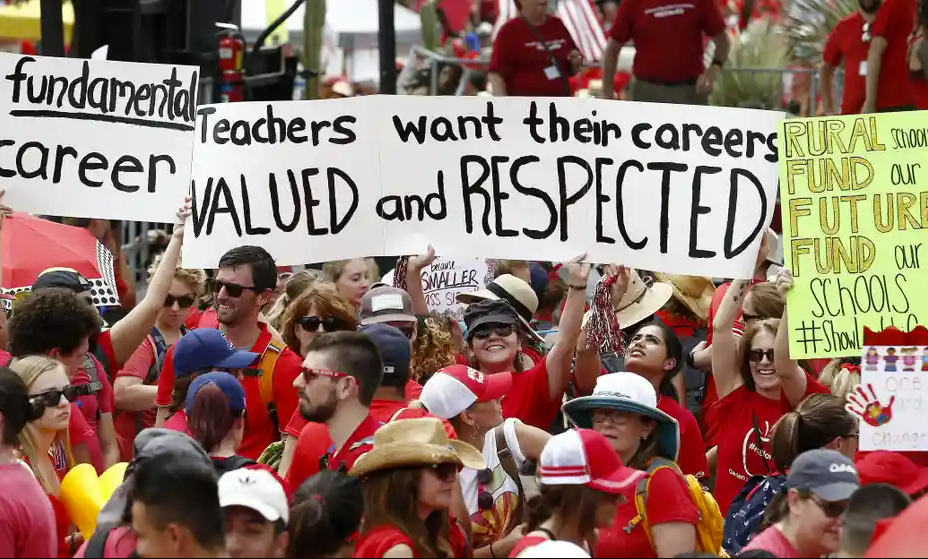Teachers are leaving the education profession at an alarming rate. Whether anyone wants to admit it or not, that is the stark reality for thousands of teachers across the world. What was once a job for life has become one where people are leaving or at least wanting to escape.
There seems to be an idyllic view of teaching from those not in the profession, ranging from “But you get so many holidays! Why would you want to leave?!” to “You only work 9am to 3pm- what’s the problem with that? Why are you complaining?!” For those working in schools, they know the truth, and it is more startling than anyone realises. A video from Bored Teachers summarises a lot of what a teacher goes through and how it is resulting in teachers leaving the profession.
Let’s look at the reasons why teachers are leaving the profession. You might find you fit into one of these categories and you can resonate with the experiences outlined here. If you do, go to the Resources page to find support you need.
1) The Global Pandemic
Did you know that children have fallen behind by at least 3 years since the start of the global pandemic? Did you also know that every child aged 7 and below have not had a stable education as a result? There’s nothing anyone could have done to prevent the impact of COVID on the education of children. However, more needs to happen from authority figures in education to recognise this. Despite the setbacks children have faced, the expectations are still the same as it was before the pandemic.
How will students pass GCSE’s, A Levels or SATS if the teachers have spent the entire year trying to catch them up with the curriculum they missed? An entire generation of children have been set up to fail and teachers, no matter how hard they work beyond their means, will have blame placed on them. This brings me to my next point…
2) Lack of Government Empathy
When a government cuts education funding to paltry amounts, how do schools operate? Much like American teachers, it is more common for teaching staff to buy resources because budget cuts from a government level make it impossible for a school to run. Those big Art or Science days that run with elaborate resources that bring the lessons to life? Chances are a teacher has bought those with their own money. However, they cannot claim it back because schools do not have enough funding to compensate them.
Adding on the issues mentioned above as well as an unrelenting pressure to get results, it’s no wonder that the wellbeing of education staff is at an all time low.
3) Unrealistic Workload Expectations
Let’s look back at the “But you work 9am to 3pm- what’s the problem?! Why would you want to leave teaching?!” comment that you have probably heard dozens of times in your time as a teacher. The problem is that this is nothing more than a myth. In working practice, teaching staff are usually in work at LEAST an hour before children arrive, and stay behind at LEAST one hour afterwards. People working in schools work mostly on goodwill. The culture is established that in order to be successful as a teacher, you have to work in your own time for free.
Do you know of any other profession that expects you to work at least 8 hours a day but only pay for 6 and a half of them? Eight hours is for the lucky ones who have realised that teaching does not encompass their entire life. Unfortunately, that group is dwindling, with unions reporting that teachers work at least 50 hours a week but only get paid for 32.5 of them.
So why are teachers working 17.5 hours a week for free? Quite simply, it is because the workload expectations are unrealistic, stressful and time consuming. That 9am to 3pm time frame is the only time teachers are not bombarded with paperwork, marking to complete or in an inane meeting that is more suited for an email.
There are efficient ways to working in school, but that mountain of work won’t come down unless you work beyond your contracted hours.
4) You Are Always Watched
Have a think about your time teaching from September 2021- how many learning walks have occurred? How many observations have you been through? How many spontaneous drop ins have occurred? Unfortunately for lots of teachers, they have lost count because these events happen on a frequent basis.
While it is understandable that teaching and learning requires monitoring, the constant feeling of anxiety that stems from these events does not bode well for a teacher. It is more prevalent when teachers have made it known that they are struggling with workload. Do you need to randomly walk in and quiz children on what they are learning while a teacher is trying to make it through the day in one piece? Most of the time, the persistent Big Brother-esque watching of teachers is unnecessary.
5) You Feel “Forced Out”
You are highly experienced teacher on a good salary. Most professions value experience, but in teaching, you’re “expensive”. You feel as if you are not good enough despite years of experience suggesting otherwise.
Schools predominantly run with a business model thanks to the rapid academisation of schools. Because of this, budgets are tight and schools are now looking for “early career teachers” instead of seeking experience. Why? Quite simply, they are cheaper to hire.
If you are experienced, you might find that you go from glowing reviews in an observation to a support plan for the most menial reason. This tactic from schools is not uncommon. It is a ploy to get experienced, expensive teachers to leave and replace with new, less expensive teachers. Job descriptions now state experienced UPS teachers should not apply unless you compromise on your salary. In a nutshell, schools do not want to pay for experience these days.
How do you begin to tackle these issues?
For SLT/authority figures: Think about how teachers work and what you ask of them. Is there any way you can streamline their working day so that they are not working until the building closes, taking work home or working on weekends? There are efficient ways of working- you just need to implement them.
Look at your school calendar- do you really need to observe everyone in PSHE? Do you really need to do weekly environment walks? These add unnecessary stress to staff. Obviously if you need to talk to someone, do so, but the unrelenting watching is too much.
For teaching staff: The best advice I can give you is remember that teaching is your job, not your life. Prioritise your workload and set achievable goals for you to complete while you are at work.
I cannot state this last point enough, but DO NOT take home any school work. I have been guilty of this many times in the past. With good intentions, I take home a stack of books to catch up on marking. However, I never touched them because I have things I want to do in the evening or weekend. Keep your teacher self away from your normal self and establish those boundaries. Click here for information on how to do this.



